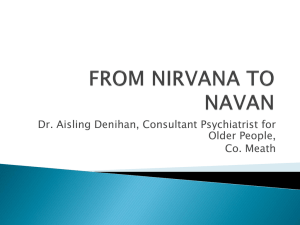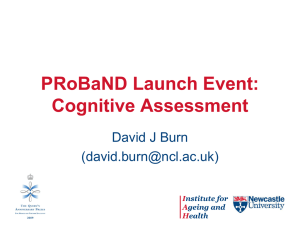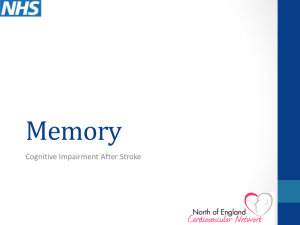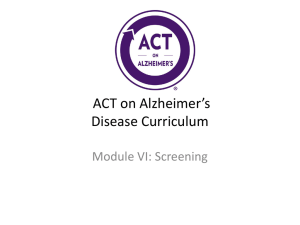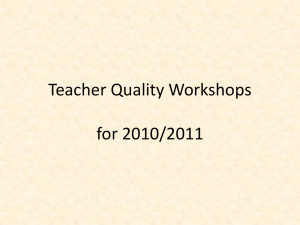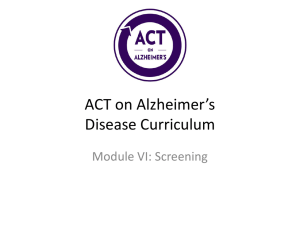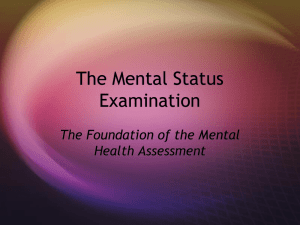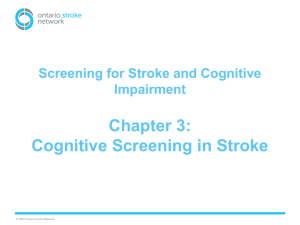Cognitive Screening Workshop
advertisement
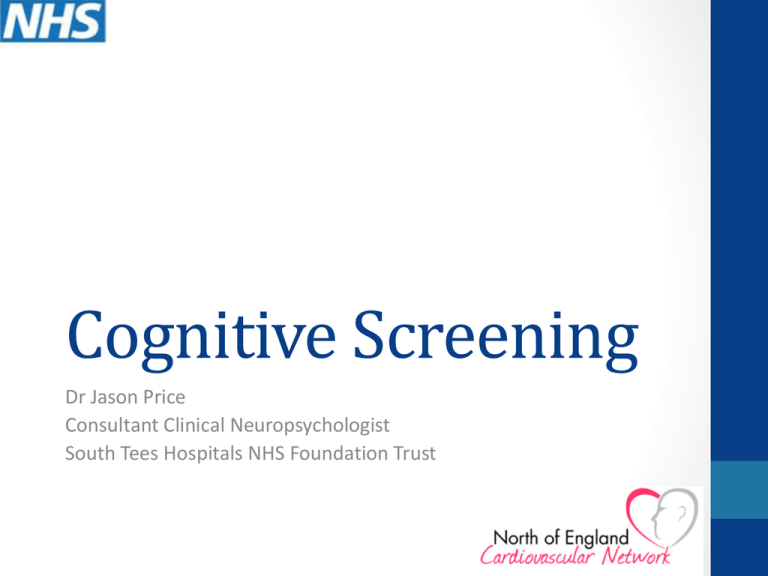
Cognitive Screening Dr Jason Price Consultant Clinical Neuropsychologist South Tees Hospitals NHS Foundation Trust Aim & Learning Outcomes • Aim: • The main aim of the workshop is to develop your understanding of cognitive assessment with stroke patients – why you would use some tests and what they would tell you about someone’s cognitive functioning. • Learning Outcomes • Understand the basic elements of what the screening tests measure. • Develop an appreciation of the ‘qualitative’ aspects of cognitive assessment: • Getting the best performance. • Getting information from HOW a patient completes a test, rather than just their score. Exercise • Get into small groups of 4 – 5 individuals. • Try to get into groups of mixed professional background and from different services. • Spend 5 minutes discussing what cognitive abilities you think should be measured by a screening test for stoke patients – think about your experiences and previous presentations. • WORK QUICKLY! • We will then look at the responses from the whole group and come up with our ‘ideal’ screening test! How could you assess these abilities? • Orientation: Time, place, self • Visuo-spatial & perceptual • Language (receptive & expressive) • Executive functions: • • • • Attention Reasoning Impulse suppression Working memory • Memory: • Learning • Recall Pre-testing • It is important to get the best possible performance you can from the patient. To help you to achieve this, consider the following: • Administer the test when the patient is as alert as they can be and as focussed on the test as possible: • Is the patient more alert in the mornings or afternoons? • Have they just returned from OT or Physio. & feeling fatigued? • Are they busy or preoccupied with something (e.g. during visiting times)? • Are they in pain or other discomfort such as too hot or cold? • MAKE SURE THE PATIENT HAS THEIR GLASSES OR HEARING AIDS IF NEEDED. Pre-testing • Consider the environment that you are conducting the test in: • Try to undertake the test in a quieter environment – such as in a private room (not always possible I know, and sometimes ‘bedside’ testing is the only option). • Make sure you won’t be disturbed. • Make sure the patient is as physically comfortable as possible to complete the tasks (e.g. having a desk/table to write on, seating that allows the patient to complete tasks comfortably). • Make sure you have all your equipment to hand, so that the assessment flows smoothly (rather thank dashing off in the middle to get a pencil, paper etc. – BEEN THERE, DONE THAT - & still do at times!). Pre-testing • Consider the patient: • Are they anxious about the test or think that it is ‘like school’. Spend a few minutes talking to them about the test, about what it will involve, what it is for and why you would like them to complete it (giving some information about how stroke can affect our cognitive abilities. • Give reassurances when appropriate. TRY TO HELP THE PATIENT BE AS RELAXED ABOUT THE PROCESS AS POSSIBLE. • If patients start to get agitated about it, postpone the assessment – pushing on will only cause the patient (and yourself) distress and the results will be inaccurate. • Does the patient have receptive or expressive dysphasia? If so, you need to think about whether cognitive screening will be useful – or whether it would cause undue distress. Preamble • You could introduce the test by saying something like: • “Good afternoon Mr Smith. How are you feeling at the minute [get an impression of how appropriate it would be for the patient to take the test at this point]. Good, I’m glad you are feeling refreshed after your lunch/sleep. I wonder if you could spare a few minutes to complete a ‘pen and paper’ type test? There are no medical tests or examinations – it’s a bit like the tests that you may see in puzzle book or in the newspapers. It just gives your brain a bit of a ‘work out’. This test will help us to see if you have any problems with your cognitive abilities – like memory or attention/concentration or any visual or language problems. It is very common for people to have difficulties with these things after having a stroke, so we would like to see if you do have any problems. This can help us with your rehabilitation and we can also use it as a way to chart your recovery. Is there anything you would like to ask me about the test? We can have a quick chat after the test about how you have done, but I may have to look at the results in more detail later and get back to you. “ Choice of Test • Various cognitive ‘screening’ tests. • No specific cognitive screening test for stroke. • A ‘good’ test should be: • Sensitive: • Detects impairment when it is present • Specific: • Does not give ‘false positives’ – i.e. saying someone has impairment when they don’t! • Some very brief – e.g. GP Assessment of Cognition – too brief!. Screening Tests • MMSE: • Good for detecting significant impairment (good specificity) – because it is hard to do bad on this test! But this will probably be obvious without the need for screening tests! • However, it does not give us a lot of information about more subtle cognitive problems or ‘executive’ problems. • Suggested not useful screen for detecting memory and overall cognitive impairment following stroke. • Up to 47% ‘misses’ in detecting cognitive impairment following stroke (i.e. poor sensitivity). • Also, it is now under Copyright, so we should not be using it unless our Organisations have a license. Screening Tests • Addenbrooke’s Cognitive Examination Revised (ACE-R): • An extended version of MMSE & includes MMSE in it. • Takes about 15 mins. • Better at detecting impairment than MMSE, but still not great (although good for detecting problems with visuo-spatial, attention and executive impairment). • BUT – can’t use this unless you have the MMSE license, because it has the MMSE embedded in it…….!!! Screening Tests • The Montreal Cognitive Assessment (MoCA): • ‘Sits’ in-between the MMSE & ACE-R in terms of complexity and length of administration (about 10 mins.). • More sensitive than MMSE for detecting impairment in stroke (59% compared with 43% on MMSE). • Still free to use – public domain! • Becoming more popular as alternative to MMSE & ACE-R Montreal Cognitive Assessment Testing • Try to keep the instructions SIMPLE. • The test administration instructions are usually quite strict about how to give the instructions to the patient, but you always have to use a bit of common sense as well. • For example, in a learning test, the administration instructions may say that you are not allowed to repeat the instructions once given (to avoid practice/rehearsal effects). However, if Mr Smith is a little deaf and asked you to repeat the question of information because he did not hear it properly, then it would probably be OK to do so (as there would not be any element of rehearsal as he had not heard it in the first place!). • Patients often start a discussion during testing. This may relate to the test itself (‘such as what is this question for?’) or they may just be prompted into recalling a memory (‘I was never any good at exams. I remember when I did my ‘O’ Levels….’). Testing • If a patient does start a conversation, this could be detrimental to the test as it may throw out your timings or interfere with attentional or memory processes - which will have a negative impact upon the patient’s score. • Just try to refocus them back on the test. You could say something like ‘This bit tests your memory, but we’re moving on to a different item now’ or you may just have to interrupt the patient in a respectful way: ‘Lets come back to that when we finish – only a few more items to go now’. • Make a note of how the patient presents during testing – e.g. did they seem generally confused, did they engage well, were they easily distracted, did they seem tired, were they impulsive such as starting items before you had given instructions? Exercise • Volunteer to complete the MoCA, with a ‘challenging’ patient. Scoring & interpretation • Look at the qualitative aspects of the patient’s performance e.g.: • Was their drawing poor because they had poor grip/motor movement, rather than visuo-spatial problems? • Do they have pre-morbid factors which may have a bearing upon their test performance e.g. learning disability/learning difficulty, language/cultural differences? • Did they ‘give up’ on items, rather than not being able to do them or giving incorrect responses? • Were responses perseverative (i.e. the same response repeated across items – this highlights an ‘executive’ problem). • Was there confabulation in the memory test? • Was there any evidence of a learning curve in the memory test? • Noting these qualities will help further understand the patient's difficulties and inform rehabilitation. After testing • Depending upon your confidence in using the test, you can give the patient some immediate feedback. • If you don’t feel confident enough to do this, explain to the patient that you would like to go away and look at the results in detail and you will come back to then to talk about the results. • Even if patients do not obtain good scores, always try to find a positive for them. None of us like to feel as though we ‘fail’ tests or exams. • For example: “Although you have problems with your memory, the good news is that you can recall much more information if given a little ‘prompt’” • “Your scores show that you still have some way to go in improving, but you are still in the very early stages of your recovery and rehabilitation, so we can use your current test results to follow your progress.” After testing • Again, depending upon you confidence and expertise in using cognitive assessment, you may wish to follow up the screening assessment with more detailed cognitive testing. • This can give us additional information which may be helpful in understanding the patient’s problems and how this may impact upon their rehabilitation. • For example, one patient was thought to have receptive dysphasia. More detailed neuropsychological assessment revealed that the ‘language problem’ was actually a problem with working memory – the patient could only hold a few items in working memory, so more complex instructions got muddled up and it appeared that they did not understand what was being said to them. They understood what was being said, but in a muddled up way! • At this point, you may wish to discuss further detailed cognitive assessment with the Psychologist. • Feedback results to MDT, so that everyone is aware of any cognitive difficulties which may impact upon their own input and inform care planning for discharge. Dr J. MacNiven & Professor N. Lincoln - Nottingham After testing • If a patient exhibits significant executive difficulties, then they are likely to need more intensive support (as well as their carers). Discuss with the psychologist and other members of the team to make sure that appropriate support is provided. • With patient’s consent, discuss results of cognitive screening assessment with patient’s family or carers. Again, you may wish to have discussed the results with a colleague or with the Psychologist before you do. Thank you for your participation!

